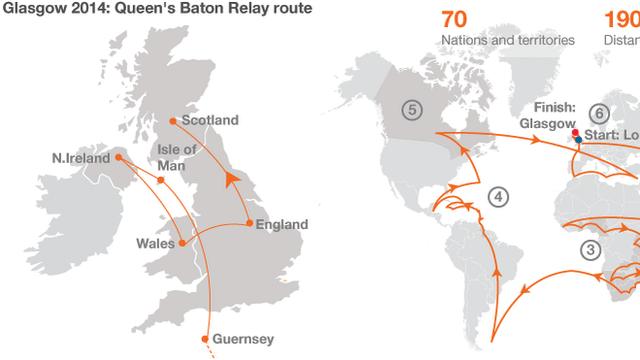Why do the children of Montserrat sing about a volcano?
- Published
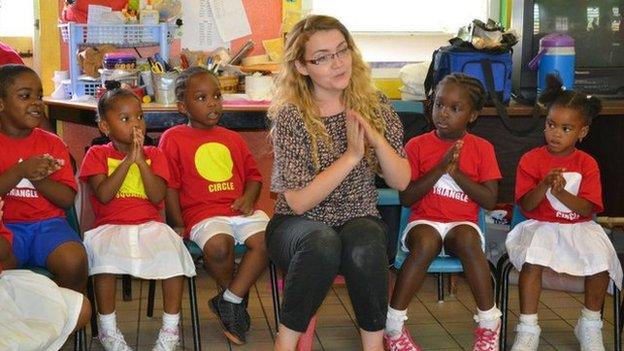
Becky Chalmers is running music projects on the island for children of all ages, as well as adults
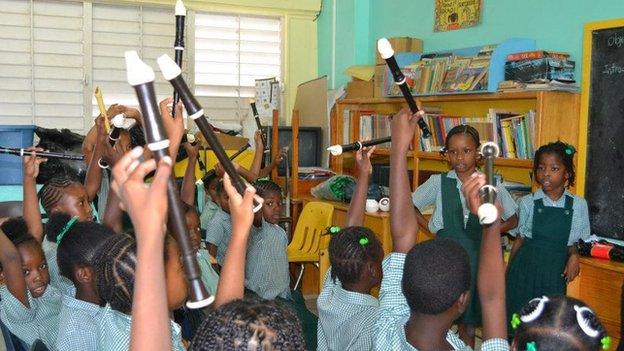
Becky Chalmers is running music projects on the island for children of all ages, as well as adults
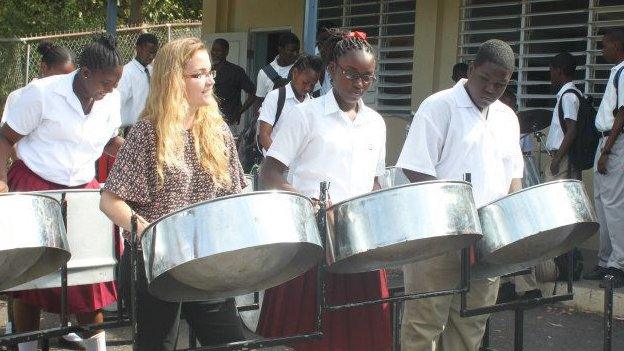
Becky Chalmers is running music projects on the island for children of all ages, as well as adults
On the island of Montserrat the children sing: "Fire up a mountain and nobody there to put it out. Scientists say run fast, we're going to need the ash masks."
These aren't words from a nursery rhyme. The folk song tells the story of a real tragedy on the Caribbean paradise nearly 20 years ago.
A devastating volcanic eruption forced half of the islanders to abandon their homes forever.
The song is a touching contrast to a glamorous era of music on Montserrat before disaster struck. In the 1980s the biggest names in the business recorded there.
Paul McCartney, The Rolling Stones, Elton John and others came to the high-tech AIR Montserrat studio, built by legendary Beatles producer Sir George Martin.
Now Martin's legacy is helping to develop new music on the British Overseas Territory.
Becky Chalmers, a graduate of London's Guildhall School of Music, is leading a project backed by Martin to bring music education to a new generation.
"It is very moving to hear these songs," says 26-year-old Chalmers. "It captures how much the volcano crisis changed the lives of people here and how much they went through.
Standing ovation
"Folk music gives people motivation to carry on and allows young people who never experienced life before the volcano to understand their history."
As well as working in schools, Chalmers, who is originally from Glasgow, founded a Montserrat National Youth Choir with 64 singers aged seven to 30. They have just staged the island's first ever musical theatre production.
"Seeing them perform brilliantly and receive a standing ovation was my proudest moment," she adds.
"The whole community was shaken up by the event. They were overwhelmed by the amount of talent they didn't know they had.
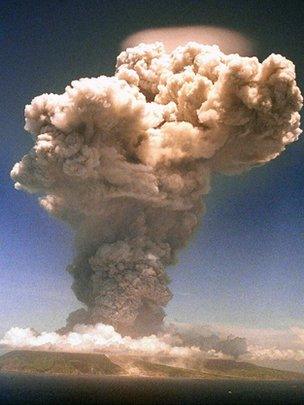
Thousands left the island forever after the enormous 1997 volcano eruption, which left 19 people dead
"Older people still remember the AIR studios era and all the musicians who came to Montserrat. They were regularly out socialising in the bars in Plymouth."
Today Plymouth, the island's former capital, remains buried under volcanic rubble.
The town was evacuated when the dormant Soufrière Hills volcano erupted in 1995. Another large eruption in 1997 caused the deaths of 19 people. The entire southern half of the island has been cut off by ash and pyroclastic flows.
More than 7000 islanders left Montserrat and those that remained resettled on the northern coast. Around 5000 live there today, but Soufrière Hills is still active.
Monserrat Volcano Observatory was set up to ensure life could continue, by monitoring activity and maintaining an exclusion zone in the south.
Sir George Martin's former studio sits on the very edge of this zone.
"Before we came to Montserrat there was no western music to speak of on the island," says Martin.
"Building AIR meant that many leading recording artists came to stay. It cast its spell on them as they mingled with the local people. It was and still is a unique place."
Hurricane devastation
Martin fell in love with the island when he visited with his wife in 1977. The locals didn't believe him when he announced plans to build a recording studio. Two years later AIR Montserrat opened its doors.
Martin already had a UK studio. He had founded Associated Independent Recording (AIR) in London the mid-1960s.
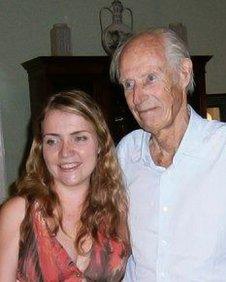
Chalmers is leading the musical work supported by Sir George Martin
His Montserrat facility had the most advanced recording technology of the time, and importantly, more sunshine than its London counterpart.
It drew an incredible roster of artists including Michael Jackson, Stevie Wonder, Eric Clapton, Lou Reed, Ultravox, Duran Duran and Black Sabbath.
Dire Straits' Brothers in Arms and The Police's Ghost in the Machine are two of the classic albums recorded there. The Police also used the exotic surroundings to film the video for their 1981 hit Every Little Thing She Does is Magic.
The Rolling Stones were among the last to record at AIR in 1989. It wasn't the volcano that brought the musical era to end. Hurricane Hugo hit the Caribbean and the studio was part of the destruction.
"After ten great years of recording there the music business had changed," explains Martin. "The moguls running the business no longer wanted their artists miles away, outside their control.
"That coincided with the devastation caused by the hurricane and sadly the studios had to close.
"The people of Montserrat are still very proud of the work that was done at AIR Studios," adds Martin. "It's only fitting that we continue and support music development."
The volcano was a shattering blow for an island still on the mend from the hurricane.
To aid the recovery, Martin organised the 1997 Music for Montserrat concert at the Royal Albert Hall with Sir Paul McCartney, Phil Collins and many others who recorded at AIR.
Continued efforts helped to raise around $1.5m (£0.9m) for a new cultural and community centre in 2007.
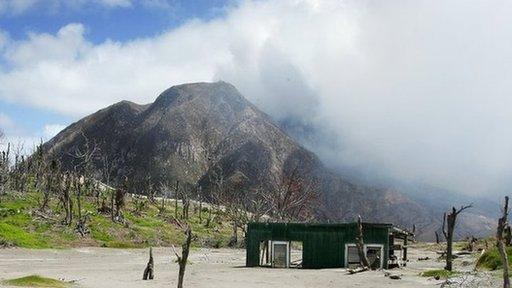
Activity from Soufrière Hills continues to affect the south of the island
For his current project, Martin approached Guildhall School of Music - where he himself studied - to create the Montserrat music placement.
It is funded by the Montserrat Foundation charity, of which Martin is a trustee. Becky Chalmers is the second graduate to be involved.
Volcanic energy
"It is an incredible feeling to be representing a musical legend", says Becky. "He has done so much for the community since the volcanic crisis."
The 2014 Commonwealth Games Queen's Baton Relay arrived on Montserrat on 25 March and found an island very different to the struggling territory of the late 1990s.
Now a new town capital is being built at Little Bay in the north, and plans are in place to use geothermal energy from the volcano to generate power for the island.
Chalmers' two year stint on Montserrat will come to an end in July. Like Martin, she has fallen in love with the island and its people.
"I have taught almost every single child on the island," she says. "I can't go anywhere without them waving and shouting 'teacher Becky' at me.
"The children here have a natural musicality. It is a joy to work with them. It will break my heart to leave."
Find out more about the Montserrat music project at Becky Chalmers' blog From London to Montserrat, external.
Queen's Baton Relay: Glasgow 2014 has regular updates on the BBC News Channel, BBC World News and online.
- Published30 August 2013
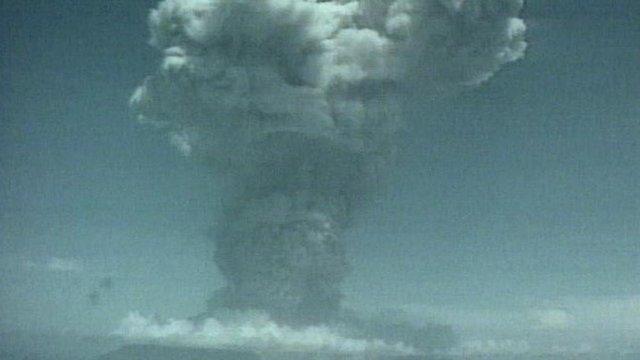
- Published18 July 2014
